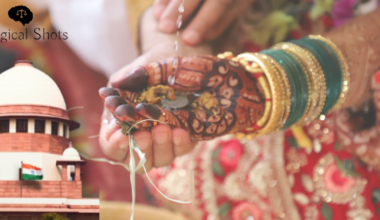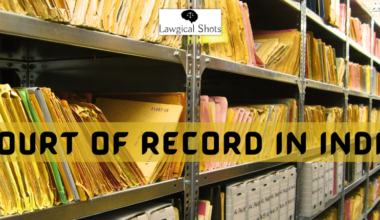There is a very famous saying in India – “Zillat ki Zindagi se toh Izzat ki Maut Behtar hai”. It means it is better to die with dignity rather than living in disgrace. This is the importance of reputation in our society. The Constitution of India through Article 21 extends the right to life and personal liberty upon the citizens of India. Defamation in BNS and civil laws is a significant violation accompanying negative consequences. The Courts have expanded its umbrella by including several aspects which are important for the livelihood of humans in a society. Right to reputation under Article 21 of the Constitution was upheld in a similar manner. The Supreme Court has time and again discussed the importance of reputation. Here is a compilation of such case laws pertaining to reputation as a right to life.
Supreme Court Judgments on Right to Reputation under Article 21
Umesh Kumar v. State of Andhra Pradesh (2013)
The Division Bench of Dr. Justice BS Chauhan and Justice SA Bobde connected the dots between right to life and right to reputation under Article 21. While holding reputation as a necessary element to right to life of a citizen, the Court observed that “A good reputation is an element of personal security and is protected by the F Constitution equally with the right to the enjoyment of life, liberty and property”.
The Bench beautifully summarized the essence of right to reputation under Article 21 with the words “Reputation is ‘not only a salt of life but the purest treasure and the most precious perfume of life.’”
Dr. Mehmood Nayyar Azam v. State of Chhattisgarh (2012)
The Division Bench of Justice KS Radhakrishnan and Justice Dipak Misra dealt with a case of compensation for a person, doctor by profession, humiliated in custody. The Court did not miss out on the opportunity to expand the scope of right to reputation in Article 21 of Constitution, but also the role of Courts slipping in legal recourse towards the State. The exact dialogue is as follows:
“When a dent is created in the reputation, humanism is paralysed. Living with dignity has been enshrined in our Constitutional philosophy and it has its ubiquitous presence, and the majesty and sacrosanct dignity cannot be allowed to be crucified in the name of some kind of police action. The aforesaid prologue gains signification since in the case at hand, a doctor, humiliated in custody, sought public law remedy for grant of compensation and the High Court, despite no factual dispute, has required him to submit a representation to the State Government for adequate relief pertaining to grant of compensation after expiry of 19 years with a further stipulation that if he is aggrieved by it, he can take recourse to requisite proceedings available to him under law. This is not only asking a man to prefer an appeal from Caesar to Caesar’s wife but it also compels him like a cursed Sisyphus to carry the stone to the top of the mountain wherefrom the stone rolls down and he is obliged to repeatedly perform that futile exercise.”
Vishwanath Agrawal v. Sarla Vishwanath Agrawal (2012)
The Division Bench of Justice Deepak Verma and Justice Dipak Misra analysed the extent of cruelty by wife and whether it could be a ground of divorce for the husband. The Court looked at the instances “denting the reputation” of the petitioner husband. The Court expressed concern for the husband and expressed that “Reputation is not only the salt of life, but also the purest treasure and the most precious perfume of life. It is extremely delicate and a cherished value this side of the grave. It is a revenue generator for the present as well as for the posterity.” Thus, the Court allowed the decree of divorce in favour of husband.
Kishore Samrite v. State of UP (2012)
Hinting at the terminology used in Article 21, the Court explained that ‘person’ not only covers physical body and members, but every bodily sense and personal attribute. With this expansion of scope, the Court embraced the reputation to reputation under Article 21 as acquired by a man. The Court further stated that “Reputation can also be defined to be good name, the credit, honour or character which is derived from a favourable public opinion or esteem, and character by report. The right to enjoyment of a good reputation is a valuable privilege of ancient origin and necessary to human society. ‘Reputation’ is an element of personal security and is protected by Constitution equally with the right to enjoyment of life, liberty and property.”
The Apex Court went on to distinguish between reputation and character of a person. The Court expressed that “Although ‘character’ and ‘reputation’ are often used synonymously, but these terms are distinguishable. ‘Character’ is what a man is and ‘reputation’ is what he is supposed to be in what people say he is. ‘Character’ depends on attributes possessed and ‘reputation’ on attributes which others believe one to possess. The former signifies reality and the latter merely what is accepted to be reality at present.”
Kiran Bedi v. Committee of Inquiry (1989)
Kiran Bedi is a name of power back in the days when she emerged as the first woman IPS Officer in India. The matter here involves her and another pertaining to the lawyers and police sequel to an incident. While dealing with the likelihood of an inquiry prejudicially affecting the reputation of a person, the Court sought to explain the importance of reputation. The Bench referred to the words of caution said by Lord Krishna to Arjuna in Bhagwad Gita with regard to dishonour or loss of reputation. The lines were – “Akirtinchapi Bhutani Kathaishyanti te-a-vyayam, Sambhavitasya Chakirtir mara- nadatirichyate.” (234) (Men will recount thy perpetual dishonour, and to one highly esteemed, dishonour exceedeth death). The said part signifies that people cherish their reputation a lot, and its dishonour exceeds the pain of death.
The Court further mentioned Blackstone’s commentary of the laws of England, Vol- I, IVth Edition, on page 10 wherein personal security of a person has been discussed. It states that “the right of personal security consists in a person’s legal and uninterrupted enjoyment of his life, his limbs, his body, his health and his reputation.”
Board of Trustees of the Port of Bombay v. Dilipkumar Raghavendranath Nadkarni (1982)
The Court discussed the adverse effect of departmental enquiries to stigmatize, resulting in a future so bleak, putting the reputation and livelihood at stake. The Bench explained that “The expression ‘life’· has a much wider meaning. Where therefore the outcome of a departmental enquiry is likely to adversely affect reputation or livelihood of a person, some of the finer graces of human civilisation which make life worth living ·would be jeopardised and the same can be put to jeopardy only by .Jaw which inheres fair procedures.“








